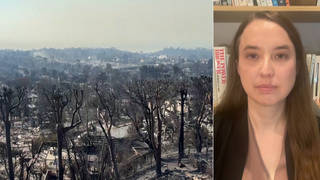
Related
World leaders are gathering at the United Nations next week for a major summit on climate change. On September 21, more than 100,000 people are expected to attend the People’s Climate March being held in New York City. We talk to Rep. Jim McDermott about his bill, the Managed Carbon Price Act, that aims to reduce air pollution in the United States by establishing a federal price on the emission of greenhouse gases that are responsible for causing global warming. We also hear from one of the more than 170 climate activists from across the United States who are traveling to New York on “The People’s Climate Train” to attend this Sunday’s march. New figures show last month was the warmest August on record around the globe. According to NASA, West Antarctica saw hotter temperatures of up to 8 degrees Celsius higher than normal, or 14 degrees Fahrenheit. This year so far is the fourth hottest on record.
Transcript
AMY GOODMAN: Congressman McDermott, last question. I want to ask you about the climate change crisis. Next week, world leaders gathering here at the U.N. for a climate summit, major march planned here for New York on Sunday, the People’s Climate March. Earlier this year, you reintroduced legislation to reduce harmful carbon dioxide emissions and raise the cost of climate pollution. Very briefly, can you explain what you’ve proposed?
REP. JIM McDERMOTT: Well, you know, this last week we had a conference in Washington, in Seattle, and Henry Paulson came out and came out for a carbon tax. And I thought to myself, when Henry Paulson and Jim McDermott agree on something, it’s about time to do it. We have got to take a national stand to protect ourselves, but also to take our leadership position in the world. And I think that you’re going to see a carbon tax debated in the next Congress. I think it’s time for us to face the fact that the Arctic ice cap is melting and the Antarctic is also melting, and we cannot have the effects of climate change without tremendous disruptions to our country and to the world, really, economy. So I think it’s going to be a matter of debate in January.
AMY GOODMAN: More than 170 activists from across the United States are traveling to New York on “The People’s Climate Train” to attend this Sunday’s People’s Climate March. The activists have been riding together on an Amtrak train from San Francisco. Democracy Now!’s Denis Moynihan joined the train near Denver, Colorado, and spoke with Climate Train participant Pennie Opal Plant.
PENNIE OPAL PLANT: As a grandmother, for me, this is the most important thing I could ever be doing. And I’ll be joining the indigenous bloc when we get to New York, and there are indigenous people coming in from all over the world. And so, look for us. We’re going to be there. We’re going to be strong. We’re going to be powerful. We are the people that are on the front lines at all of the fossil fuel extraction sites, from the tar sands to the Bakken oil fields to what’s going on in the Amazon, Yasuní, Peru, everywhere.
AMY GOODMAN: That was Pennie Opal Plant on the Climate Train. Congressmember Jim McDermott, we want to thank you for joining us from Washington, D.C. And Democracy Now! will be out covering the major protest on Sunday. You can go to our website at democracynow.org to watch that protest and to see and hear the interviews. Also tomorrow on Democracy Now!, we will spend the hour with Naomi Klein. She is out with her new book, her new opus; it is called This Changes Everything: Capitalism vs. the Climate. So tune in to Democracy Now!, democracynow.org. Congressmember McDermott, thanks so much. When we come back, Billy Bragg on the Scottish independence vote that’s coming up tomorrow. Stay with us.













Media Options